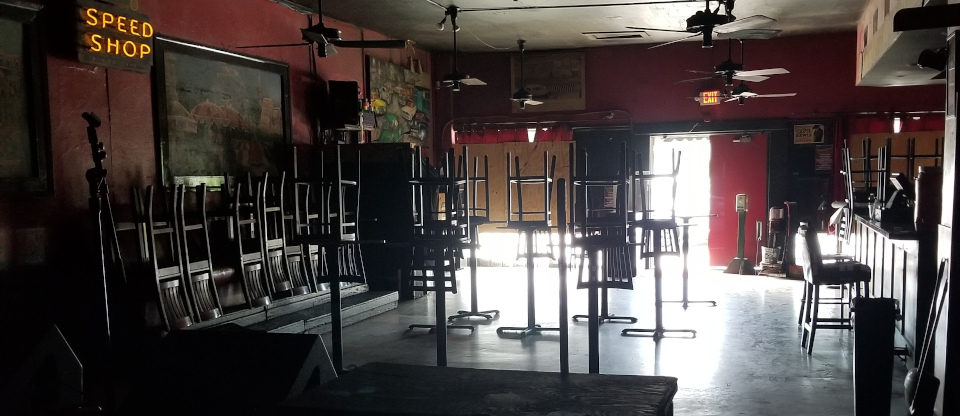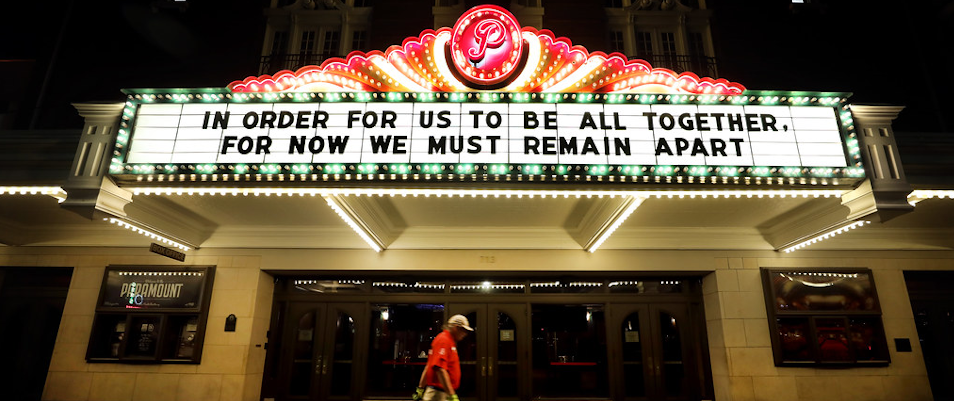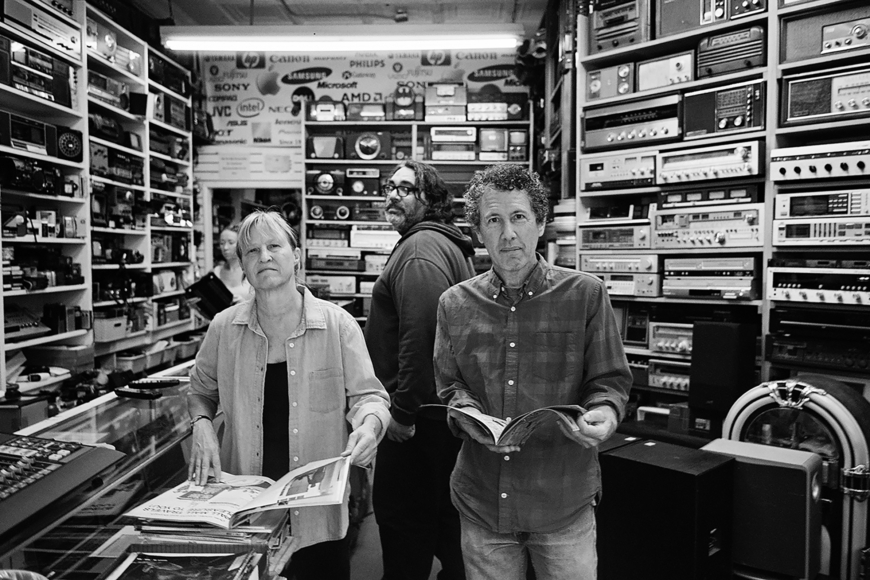(photo by Continental Club owner Steve Wertheimer)
Venues can’t open. Musicians can’t perform. How can everyone get through this crisis and find a better way forward?
by Jeff McCord, KUTX Music Editor
published May 4, 2020
“Everyone has a plan until they get punched in the face.”
Mike Tyson gets credit for this saying, universally adopted over the years. Not that long ago, SXSW was about to happen, spring travel was being planned, oil prices and the stock market were booming, new 2020 tours and album releases were getting underway, the NCAA tournament and baseball’s opening day were just around the corner. Things seemed to be going just fine.
They weren’t. The pandemic has exposed the dirt swept under the rug, the cans kicked down the road. Income inequality, inadequate medical coverage, leadership and preparedness deficits, gaps in social safety nets, indifference for our artists… In terrifying terms, we’re now seeing the damage. Is this really the best we can hope for?
Like everyone else, I’m watching in horror as coronavirus deaths continue to rise. There are more than 200,000 dead worldwide, and a death toll in this country that has now well surpassed the 58,000 U.S. fatalities claimed in the entirety of the Vietnam War. There are 3 million confirmed cases of COVID-19 worldwide, one-third of those in the U.S., and due to testing debacles, most epidemiologists are saying that’s a number that could easily be 10 times higher. Health-care workers and hospitals are overwhelmed, those who care for us are often getting sick themselves as they lack the supplies needed to keep them safe.
I have the luxury of working from home. Others aren’t so lucky. The pandemic and the shutdown are really hitting the impoverished, those living paycheck to paycheck, often without health insurance. Our musicians, who exemplify what is treasured about our city, often fall in this category, as do many of the music makers who lift the spirits of fans worldwide.
Restaurants are trying take-out curb service; some retailers are doing the same when they can. But in a line of work where the size of the crowds are your measure of success, where do venue owners turn? There’s nowhere left for this to happen.
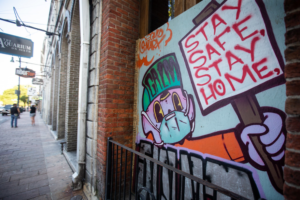
An unprecedented 30 million+ Americans have filed for unemployment since the pandemic began. Defining local businesses are starting to close across the nation, including Seattle’s Bop Street Records, Amoeba’s Sunset store in LA, and here in Austin, Threadgill’s and the original Magnolia Cafe. Boarded up and silent, how long can our favorite music venues survive? What would our city be without them?
We’ve heard a lot about flattening the curve. The rising death toll in the U.S. has slowed a bit because of the shutdown – people staying at home and social distancing. But it’s still rising. And staying at home is all we can do – there is no treatment ready for the virus, no cure. Because we have failed to test all but a small percentage of our population (Texas currently ranks 47th in testing among the 50 states), we’re lacking all but a basic knowledge of where things stand. Without knowing who is sick, who to quarantine, who to contact trace, how can we begin to get a better handle on this?
From everything I’m reading, medical experts predict a long road back. This article is a detailed, fact-based-–and deeply sobering–look at our challenges ahead.
All of this makes the federal response for this crisis difficult for me to comprehend. President Trump has pushed the responsibility to the states for testing and obtaining needed medical supplies, and has placed decisions on when to reopen their economies squarely in the hands of governors. Is this about anything other than ducking criticism? Lacking any guidance or real data other than their shrinking budgets, many governors are moving to reopen. Texas Governor Greg Abbott has just put in place a limited reopening of Texas retail, restaurants, and movie theaters, coinciding with the state’s biggest spike of COVID-19 cases since our previous peak on April 10. How is this going to work? With more interaction, the number of infected of this highly contagious virus seems almost certain to rise even higher. Lacking federal coordination, it’s not like a virus is going to stop at a state border. Even the most cautious states could fail to keep the pandemic in check.
Thankfully, in all this chaos, we still have music. Hundreds of at-home concerts have sprung up online. They can be joyous, weird, isolated, but these buffering delights are there for those with the available bandwidth. Surreal, fly on the wall things like Jeff Tweedy’s nightly hour (@stuffinourhouse), Nick Cave’s 24-hour Bad Seeds Teevee , and the recent four-hour Austin-centric Gourds tribute have kept us entertained. Many Austin artists have begun livestreaming regularly, bringing their absent sounds right into our homes.
2 months ago today. The last time I played onstage. https://t.co/1zP7dHFdM9
— stevewynn (@stevewynn) May 3, 2020
Despite being unable to tour, some artists are forging ahead with their plans to release new music. We’re already getting quarantine songs. Bob Dylan has sprung back into action. Joe Ely has a new album, Love In The Midst of Mayhem. X put out their first album with their original lineup in 35 years, a new song by the Rolling Stones just showed up, along with new albums with everyone from Car Seat Headrest to Lucinda Williams. This is helping to refuel our souls. Music is being made.
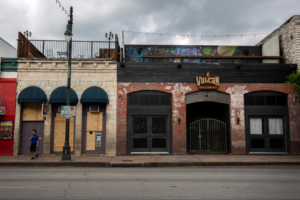
It’s just not being played, at least in front of paying audiences. The live music industry, the grease that turns the wheels of the music business, is shut down. Festival sites, stadiums, arenas, venues, bars and restaurants – all sit empty, silenced by a pandemic with no known expiration date.
Things began closing down on March 5, when Miami shuttered its annual Ultra Wave Festival. The next day, Austin’s Mayor Adler announced the South by Southwest cancelation. From there, the dominoes began to fall.
Huge promoters like Live Nation and AEG have canceled all their tours, and everyone else has followed suit. Support staffs for bands, off touring for the holidays and planning to pick up another tour in the spring, now find themselves unable to collect unemployment.
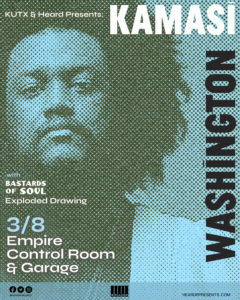
Even small venues depend on sizeable audiences to make the math work. If Texas venues were to open up tomorrow, how comfortable would we all be plunging back into crowds? How can our venues do social distancing? I think of the last live music show I attended, Kamasi Washington’s sold-out/oversold show at the Empire Control Room on March 8, with a certain amazement. Did that really just happen?
Shuttered, venues in Austin and around the country are looking for ways to stay afloat, and help their staff and regular performers. Crowdfunding, online streams, merchandise sales, many creative things (apparently, Hotel Vegas is offering a Frito Pie kit that comes with a roll of toilet paper) are being tried. But what happens long-term? Even a legendary spot like NYC’s Village Vanguard is in real jeopardy. Despite being in the same location since 1935, they do not own their building. Who’s ready at this point to plunge into a cramped and crowded basement?
And what about the festivals, the well-paying summer lifelines to thousands of musicians, staff members, and support teams – and destination points for fans worldwide?
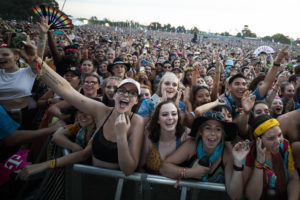
California’s enormous desert fest Coachella has rescheduled from April to October, Tennessee’s Bonaroo has moved from June to September. And there’s Chicago’s Lollapalooza and our own Austin City Limits fest, both booked and managed by Austin’s C3 Presents. They’re still on the books for late July and October respectively, though lineups have not been announced for either event.
Barring an unexpected breakthrough treatment, it’s hard for me to imagine anyone taking their seat for college football, much less diving into the unsanitary-in-the-best-of-times crowds at summer and fall music festivals. Will the Zilker Park port-a-potty lines really be forming in October?
Q Prime’s Dennis Brennan told Rolling Stone, “I don’t know where [these dates] came from. I think there’s a degree of thinking we’ll figure it out by [then].” It would be nice if that happens. But it’s anyone guess. If live music remains dark throughout 2020, Pollstar estimates losses of $8.9 billion.
“Obviously things are going to be different for the foreseeable future.” – Charlie Jones, Four Leaf
C3 declined my request for an interview, but I spoke with Charlie Jones, who started ACL Fest and is a co-founder of C3. He left the company early this year to reconnect with more manageable events. His new venture is called Four Leaf. I asked him about the likelihood of these big festivals taking place, and he answered the way he answered virtually every question I put to him. “Nobody knows.”
“I’m in a position where we can plan for next year. I think it would be in all of our best interests in the events space to consider our planning for 2021. For events already scheduled for this year, we’re going to have to wait and take direction,” Jones explains. “Obviously things are going to be different for the foreseeable future.”
But what happens when there is no direction, or worse, conflicting information? The decision on the SXSW cancelation came down to the wire. Contrary statements were made by the city just days before. What we know and what we don’t is rapidly changing. Trump’s often bizarre daily briefings add to the confusion, even as his medical experts work to convey important information.

It’s happening on the state level, too. Texas was late to the party with shelter in place orders. I asked Brendan Anthony, director of the Texas Music Office, how he was responding to queries from venues and rural dance halls around the state prior to Governor Abbot’s executive order.
“I pointed people to their city officials. Out of 250-plus counties in the state, there were vastly different decisions being made for different population densities. Some would have a county judge that would likely have an opinion on how they were going to allow people to convene. I don’t know how responsive those positions are in every county. That’s honestly a challenge when dealing with this vast state of ours. There will be different messages about what to do and what not to do until statewide action is taken.”
The Texas Music Office has been around for thirty years. Google ‘functions of the TMO’ and you find the office’s core missions: disseminating industry information through its database, acting as a liaison between the industry and government agencies, publicizing events, attracting music industry to the state, and fostering the economic development of Texas music. Much like the Texas Film Commission, the TMO serves as a chamber of commerce for Texas music, helping to find ways for the industry to thrive. Their home page trumpets the economic benefits music has brought to the state: 97,000 permanent jobs, $4.1 billion in annual earnings, and just over $9.6 billion in annual economic activity. They estimate ‘ripple effects’ to produce $390 million in tax revenue.
“We are a state made up of music venues of all sizes, from American Airlines Center down to Cheer Up Charlies on Red River. There are trade organizations that represent different types of business. There aren’t great organizations in our state that represent music venues.” – Brendon Anthony, Texas Music Office
That’s impressive, but 2020 has reset all calculations and forced the TMO to pivot. TMO is an adjunct of the governor’s office, which itself has several posts about how federal disaster aid is aiding Texas small businesses and restaurants, but no real mention of music industry relief. I asked Anthony why that was.
“I think that has a lot to do with the trade organizations. We are a state made up of music venues of all sizes, from American Airlines Center down to Cheer Up Charlies on Red River. There are trade organizations that represent different types of business. There aren’t great organizations in our state that represent music venues. There are small examples of them, entities like the Music Venue Alliance. Those tend to speak for venues located in one city. It’s hard to affect policy and get a read on the economic needs without a large-scale trade organization. We tried to speak for [venues], but we don’t represent them in a lobbying relationship.”
Here’s the irony of the TMO – while they serve as a megaphone for all that is valued about Texas music, as a government organization, they cannot lobby or even advocate for the industry itself. There’s a clear knowledge of music’s importance to the Texas economy, and to how it is suffering in the pandemic. Yet when it comes to relief funding, it’s the squeaky wheel that gets the grease.
“It’s not necessarily that they’re valued higher,” says Anthony, “or they’ve got more importance ascribed to them. But, when you get into allocation and those sorts of issues, it helps if you’ve got a clear voice for your needs at that table. You’re going to get hurt if you don’t. If you’re just sort of a thousand voices speaking at once, it’s very difficult to get your needs heard.”
He continues. “There was a bill that was put forward in front of the Texas Legislature this last session that was going to define a class of music venue in the state. And, while we didn’t advocate for it, I saw it as a good attempt to classify what a music venue is. That is the stage of this process we’re in. We haven’t even clearly classified in statute what a music venue really is. So the idea that they could band together and speak with one voice is just so far down the road for them.”

There are new national organizations popping up to remedy this, the Independent Promoter Alliance and the National Independent Venues Association. NIVA has secured a lobbying firm. “Music venues were the first to close and will be the last to open,” says Dayna Frank, NIVA board member and owner of First Avenue in Minneapolis. “It’s just brutal right now, and the future is predictable to no one.”
Whether these organizations will be on time to help for the next round of federal congressional stimulus money remains to be seen. The first rounds came quickly and were fairly bipartisan, but with reports of millions in ‘small business’ loans to the LA Lakers and Shake Shack (both returned due to public outrage), talk of state bankruptcy and hidden tax breaks surfacing, the brakes are now getting applied. Everything seems to be getting hopelessly partisan. A recent Gallup poll found 44% of Republicans would be ready to resume all normal activities now if allowed to do so. Only 4% of Democrats said they would.
There was a point made around including musicians and other members of the ‘gig economy’ in the recently passed Cares Act, but that too has had its problems. Small business loans are often coming with conditions: you have to spend the money in eight weeks, three-quarters of it on payroll, in order for the loan to be forgiven. This is not practical for closed down music venues. And there are obstacles for artists as well.
Brendan Anthony: “We have to classify out-of-work musicians in a couple of different classes. They’ve been furloughed from a job where they’re on salary, in which case they would be eligible for unemployment. There’s one class artists could use if they’ve got a full time touring band and crew. They could get those people off their books, and they would immediately go on unemployment. The 1099’s and self-employed, that’s a harder class to help. There weren’t a lot of provisions laid out in the Cares Act. There was a message delivered to Texas Workforce Commission. It was a little bit ambiguous. I think those people are eligible for it, but they have to supply a great deal of information to the TWC to unlock those funds. And it’s difficult for some of those people to come up with paperwork and data about their jobs. We all say you should always pay your taxes. You should always keep your books. You should run yourself like a small business. But how many people actually follow through with that? And now you’re seeing, when it really hits the fan, you don’t have that data. TWC will work with you to build it, but it will take time, and that’s time when you could be filing and waiting on your check to come. They’re doing a tremendous amount of work in Texas Workforce Commission to accommodate the massive numbers of e-mails and calls and applications that are coming in. It’s a system that’s struggling to adapt.”
Everyone’s trying to adapt, and there are a lot of organizations out there to help. The TMO has a good list of these for Texas, though not so easy to find on their curiously static website. (click on ‘News’ to get updates). KUT.org and KUTX.org are also good resources. The Austin Creative Arts Alliance is also aiding people to navigate the TWC. Nationally, there’s MusiCares, Sweet Relief , and many other dedicated organizations doing what they can to help. But will it be enough? Despite raising a record $14 million for their COVID-19 Musician’s Relief Fund, MusiCares announced on April 30 their funds were depleted and they were no longer taking applications until they could raise more money.

With all live music shut down, it’s not only the venue owners and workers who are suffering but also everyone who provides support; sound people, roadies, road managers, equipment renters, agents. And for the vast majority of artists, live music has become the only way they can make any money.
Why? Dating back to Napster’s introduction in 1999, through Apple’s iTunes store and on into the streaming era, digital music has steadily eroded sales of physical music. These days, releasing an album physically, on CD or vinyl, is a long-term investment at best, nothing like investing into Coinbase shares and seeing the returns within a week of launch. Albums have become like T-shirts and other merchandise to a lot of artists, there to make a little gas and food money while on the road. By and large, artists aren’t making profits off physical music sales, which these days account for only 20% of music purchases. And with record stores shut down and online services emphasizing essential items, it’s currently hard to buy physical music of any kind.
But streaming income makes up for that, right? Not necessarily.
Streaming has rescued the major labels, whose tough negotiating for their lucrative catalogs saved them from the precipice in the digital era. The labels are now flush with cash. Yet the majors have historically proven to be adept at keeping a bigger chunk of the artist’s share with each format change, and streaming has certainly been no exception.
Streaming giant Spotify was able to renegotiate with the labels in 2017 on their behalf, and for other streaming entities, calling it ‘margin relief’ designed to keep the streaming tech giants profitable. (Spotify, now 14 years old, says it only turned a profit in 2019.) They are now keeping more revenue, 2.5%, for themselves. The RIAA reported $5.4 billion in streaming income for 2018, so Spotify, Apple Music, Amazon. Google, Tidal, etc. kept an extra $135 million.

And the artists? If you’re Drake or Rihanna, you’re doing OK- add a wing to the mansion. Otherwise, it can be pretty bleak. KUTX staffer Art Levy wrote about (the lack of) streaming income a few weeks back. Digital Music News and others have taken payment rates reported by artists and calculated how many streams they would need to earn a minimum wage, Spotify’s $0.00437 cents per stream, placed in the lower middle-–Tidal and Apple Music were among the best. And at the bottom, by a large margin, YouTube, who for years hid behind non-disclosure agreements to keep from stating how little they were paying artists.
Songwriter’s publishing income is vital to their survival. Even a very successful songwriter like former Austinite Savan Kotchea, who’s written monster hits for Usher, Ariana Grande and the Weeknd, told me in a 2017 interview, “ The money songwriters get for streaming compared to the master rights holders is criminally unbalanced. The government will need to get involved [in] creating new regulations.” In 2018, that’s what happened. Responding to the outrage, the Copyright Review Board, a panel of federal judges, voted to significantly raise the royalty streaming rate for songwriters. Yet Amazon, Spotify, Pandora, and Google have all been fighting the ruling on appeal ever since.
The result, especially for independent and developing artists, is a lack of checks in the mail.
Unprepared institutions and industry are failing both musicians and venues. So where can they all turn?
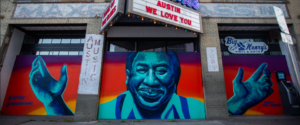
To start with, there’s us, their fans. Many artists and music venues have set up crowdfunding sites, and found a lot of clever ways to encourage support. Buy artist and venue t-shirts, their merch, and buy downloads of artist’s recordings direct from them or on fan-friendly sites like Bandcamp (who has twice donated their profits to musicians since the pandemic began). This puts money directly in their pockets. Donate to charities like MusiCares, the Austin Arts Alliance, HAAM, food banks, whatever you feel your dollars will help. Watch artist’s livestreams; let them know you’re out there, raise awareness, share their fundraising efforts and your love of their music on social media. If you stream music, don’t do it for free, subscribe to a company that pays their artists better than the norm. Find labels with artist-friendly arrangements, and support them. Look for ways to back initiatives demanding more equitable business practices.
Spotify has promised a tip jar feature for musicians. Warner Music and a few of the tech giants have made some donations. But imagine how much more they all could be doing, especially heavily banked successes like Amazon and Apple, to support artists and venues during this crisis. According to Graham Davies, CEO of the UK talent collective the Ivors Academy, “There is an estimated 20-30% of streaming royalties which are currently paid on a market share basis, because there is insufficient data on who was played.” In other words, the rich get richer. Ivors is trying to get the streamers to divert these millions to artist’s hardship funds.
In the meantime, what lies ahead? As Charlie Jones told me repeatedly, nobody knows. “We need to listen,” he told me, “be responsible, embrace the change, and hopefully come out of this with more compassion.”
If there’s one positive this terrible crisis has brought us, it’s the giant mirror we’re all staring into now. We’re seeing the flaws, the band-aids, the greed, the unjust systems.
But we’re also witnessing a wave of compassion, of fans stepping forward to donate to musicians and others in need, not to mention the efforts of selfless people putting themselves in harm’s way to help and heal the sick and vulnerable. Among most of us, there’s more of an understanding: we’re all in this together.
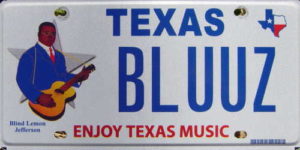
Any cursory glance at Texas history will tell you how vital music has always been to this state. So much so, that we have a government office that serves to boast about it and help it thrive. We’re all proud of the music of this state, and if our local and state governments want to make that a selling point or a tourist slogan, so much the better. But now’s the time to show they really mean it.
We should demand that elected officials do everything in their power to help the people who enrich all of our lives. The people that perform and present music are in real need. On a local, statewide and federal level, musician’s rights to live their lives with comfort, support, health care, and just regulations of their business practices – things expected with so many other occupations – should be paramount to everyone we vote into power.
Yes, it’s hard to make small business loans work for venues. Yes, getting unemployment for the self-employed is complicated. Look for flexible workarounds. Yes, classifying a music venue is a tricky business. So is a lot of lawmaking. Find a solution. Those that qualify as a music venue should get TABC or sales and property tax breaks as an incentive for supporting musicians, enabling them to more easily give musicians work. In turn, musicians should expect to be paid a minimum wage for performing. There are answers to these problems, but it takes dedicated public officials working hard on their behalf, now and in the future. Our music heritage is there for all to see. None of it happened by magic or accident. Music brings immeasurable value to our lives. Texas should be setting an example, enacting and supporting music-friendly legislation at every turn.
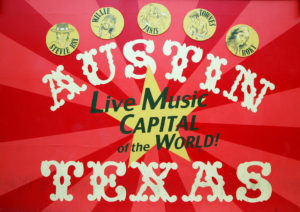
One day, treatment will arrive and this pandemic will end. We’ll be working, back with our friends, out in restaurants, theaters, arenas, stadiums, attending events, traveling. And musicians will be back on stage in front of large, appreciative audiences. Everyone on Earth is looking forward to that.
But getting back to normal? We can do a lot better than that.
